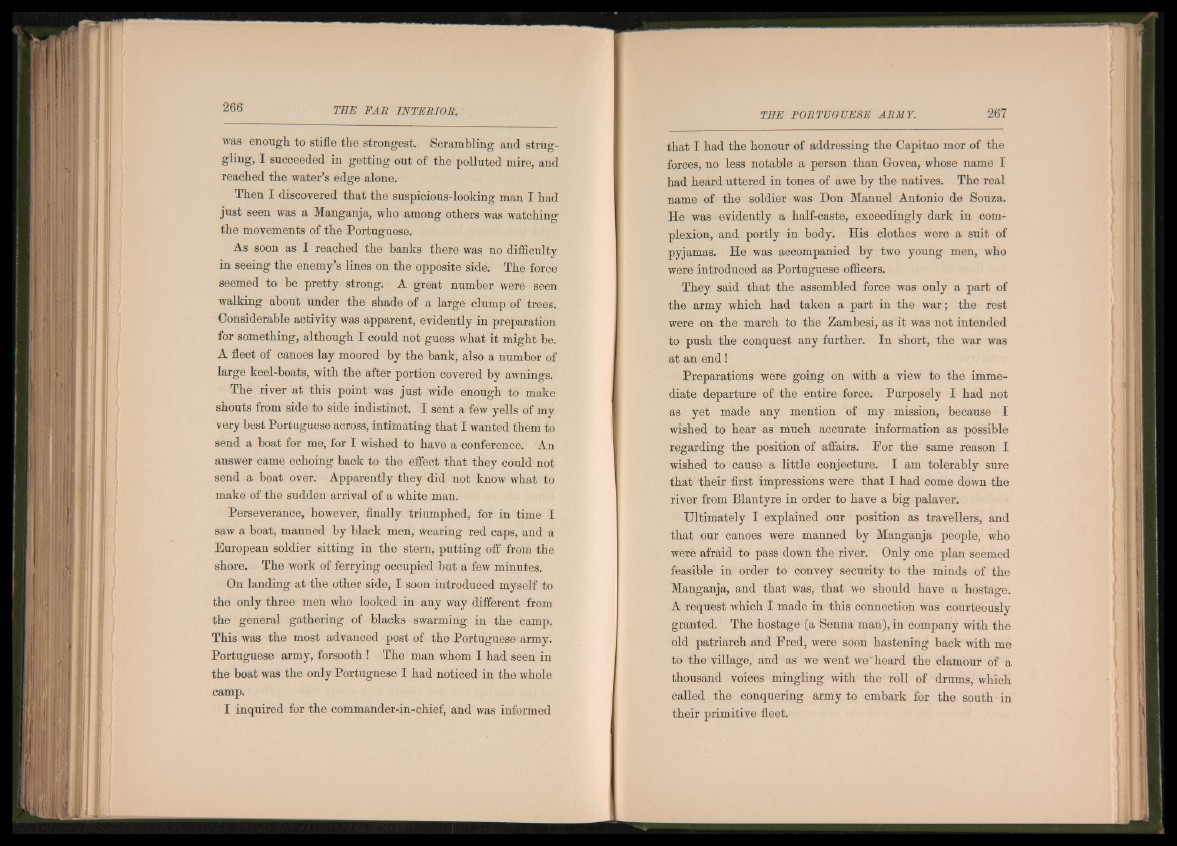
was enough to stifle the strongest. Scrambling and struggling,
I succeeded in getting out of the polluted mire, and
reached the water’s edge alone.
Then I discovered that the suspicious-looking man I had
just seen was a Manganja, who among others was watching
the movements of the Portuguese.
As soon as I reached the banks there was no difficulty
in seeing the enemy’s lines on the opposite side. The force
seemed to be pretty strong. A great number were seen
walking about under the shade of a large- clump of trees.
Considerable activity was apparent, evidently in preparation
for something, although I could not guess what it might be.
A fleet of canoes lay moored by the bank, also a number of
large keel-boats, with the after portion covered by awnings.
The river at this point was just wide enough to make
shouts from side to side indistinct. I sent a few yells of my
very best Portuguese across, intimating that I wanted them to
send a boat for me, for I wished to have a conference. An
answer came echoing back to the effect that they could not
send a boat over. Apparently they did not know what to
make of the sudden arrival of a white man.
Perseverance, however, finally triumphed, for in time I
saw a boat, manned by black men, wearing red caps, and a
European soldier sitting in the stern, putting off from the
shore. The work of ferrying occupied but a few minutes.
On landing at the other side, I soon introduced myself to
the only three men who looked in any way different from
the general gathering of blacks swarming in the camp.
This was the most advanced post of the Portuguese army.
Portuguese army, forsooth ! The man whom I had seen in
the boat was the only Portuguese I had noticed in the whole
camp.
I inquired for the commander-in-chief, and was informed
that I had the honour of addressing the Capitao mor of the
forces, no less notable a person than Govea, whose name I
had heard uttered in tones of awe by the natives. The real
name of the soldier was Don Manuel Antonio de Souza.
He was evidently a half-caste, exceedingly dark in complexion,
and portly in body. His clothes were a suit of
pyjamas. He was accompanied by two young men, who
were introduced as Portuguese officers.
They said that the assembled force was only a part of
the army which had taken a part in the war; the rest
were on the march to the Zambesi, as it was not intended
to push the conquest any further. In short, the war was
at an end!
Preparations were going on with a view to the immediate
departure of the entire force. Purposely I had not
as yet made any mention of my mission, because I
wished to hear as much accurate information as possible
regarding the position of affairs. For the same reason I
wished to cause a little conjecture. I am tolerably sure
that their first impressions were that I had come down the
river from Blantyre in order to have a big palaver.
Ultimately I explained our position as travellers, and
that our canoes were manned by Manganja people, who
were afraid to pass down the river. Only one plan seemed
feasible in order to convey security to the minds of the
Manganja, and that was, that we should have a hostage.
A request which I made in this connection was courteously
granted. The hostage (a Senna man), in company with the
old patriarch and Fred, were soon hastening back with me
to the village, and as we went we‘heard the clamour of a
thousand voices mingling with the roll of drums, which
called the conquering army to embark for the south in
their primitive fleet.